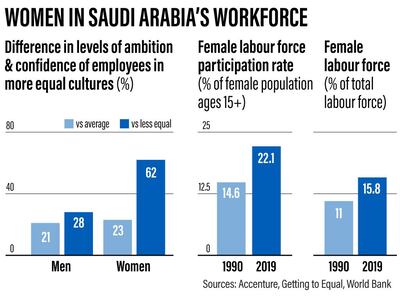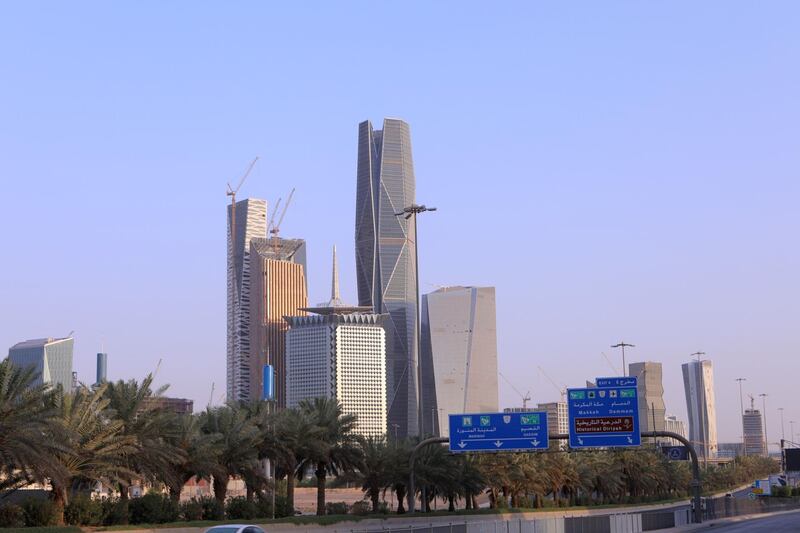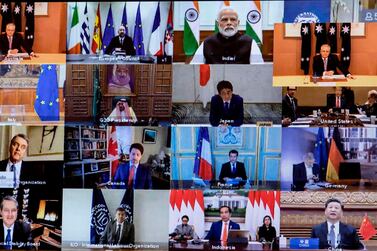Boosting the culture of equality in Saudi Arabia’s organisations can foster innovation and boost economic growth, adding more than $400 billion to the country’s gross domestic product over the coming decade, according to Accenture and Alnahda Society.
“In Saudi Arabia, a critical starting point for the career advancement of women is at the top," said Khaled Al-Dhaher, country managing director at Accenture. "Our research concludes that a positive tone from the top of the organisation goes a long way in setting out both the moral and commercial case for gender equality.”
The Women in the KSA Workforce report, offers guidelines to companies in Saudi Arabia on building healthy work environments that can help tap the potential of women in the workplace. The findings of the report were released during a joint forum between Accenture and the Women 20, an official G20 policy recommendation engagement group.
Boosting the inclusion of women in the workforce is a key objective of the Vision 2030 transformation initiative that aims to diversify the kingdom's economy, nurture domestic industries and reduce its reliance on oil. Vision 2030 aims to increase overall female workforce participation to 30 per cent from 22 per cent by 2030.
“Ultimately, a positive workplace culture facilitates a shift in the collective corporate mindset – and in turn, enables a resilient economy that is less dependent on oil and more reliant on a young and emerging generation ready to seize the limitless opportunities of the future,” Mr Al-Dhaher said.
Women empowerment is among topics that will be discussed by leaders of the world’s 20 biggest economies when they convene virtually at the G20 summit in Saudi Arabia on November 21 and 22.
An annual World Bank report, Women, Business, and the Law 2020, recognised Saudi Arabia as the top reformer globally last year measured in terms of legal differences in accessing economic opportunities between men and women.
In 2009, only 14 per cent of Saudi women above the age of 15 were employed – most of whom worked in the public sector. In the private sector, Saudi women accounted for 8.5 per cent of Saudi workers in 2009, with the majority of private sector jobs held by men and expatriate workers. Today, Saudi women make up 32 per cent of workers in the private sector, according to Alnahda’s Takafu Study, which focuses on equal opportunity in the private sector.

In the top 10 per cent of most equal organisations in Saudi Arabia, female employees’ sense of ambition and confidence is 23 per cent higher than average, according to Accenture. They are also 62 per cent more likely to advance in their careers to the managerial level or above.
The research also found that the innovation mindset of all employees in equal workplaces in Saudi Arabia is 50 per cent higher than among their peers in other organisations.
One key difference in more equal cultures in the kingdom is the role played by senior leaders.
For example, almost all women currently working in a more equal culture in Saudi Arabia said their leaders take action to get more women into senior roles.
That compares with 46 per cent of leaders doing so in an average workplace environment in the kingdom, according to the Accenture study. About 90 per cent of employees in more equal cultures say that a senior leader is actively helping them advance and grow, compared with 41 per cent on average, and just 17 per cent in less equal cultures.
It also found that women in the kingdom are more likely to thrive in larger multinational organisations. Nine in 10 women in large organisations said they “love their job” compared to 78 per cent of their peers working elsewhere; 88 per cent (vs 50 per cent) expect to stay with their employer over the next 12 months.
Accenture surveyed more than 70,000 professionals worldwide over the past three years to identify the factors that shape women advancing and thriving in the workplace. The report also builds on Alnahda’s Takafu study.
“The launch of the Takafu initiative coincided with the announcement of a series of regulatory reforms that simultaneously removed structural biases and instituted safeguards to protect women and promote their advancement, such as enforcement of equal wages and introduction of the anti-harassment law,” said Jawaher Al Sudairy, director of Alnahda Centre for Research.
“Hence, the challenge today is less about legal barriers and more about addressing practices and encouraging a work culture underpinned by equal opportunity,” she added.
The report identified five cultural actions that companies in Saudi Arabia can adopt to drive progress toward an equal culture. These include elevating female leaders in the corporate world, safeguarding against discrimination and harassment, offering greater workday flexibility, enhancing parental leave and investing in targeted training.








